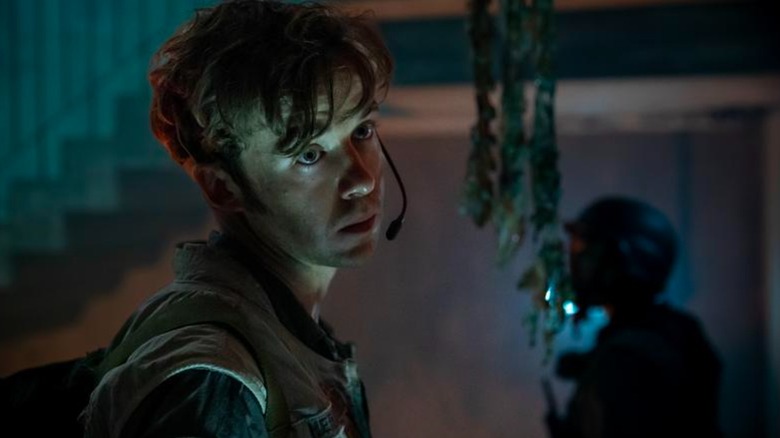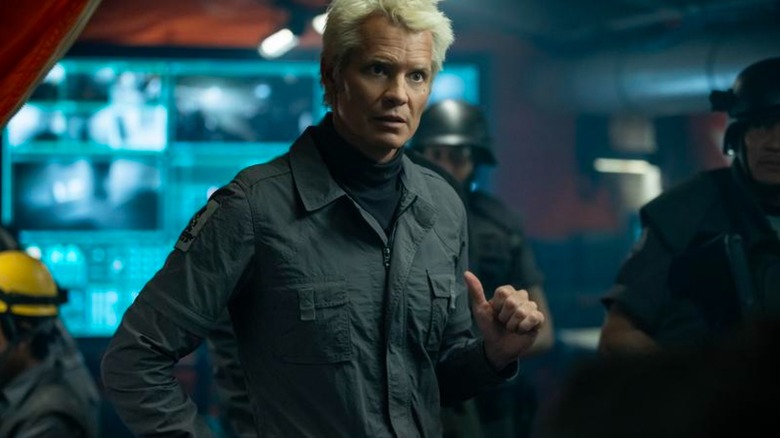Alien: Earth Is Missing One Major Element The Sci-Fi Horror Franchise Is Known For
This post contains spoilers for the two-episode premiere of "Alien: Earth."
"In space, no one can hear you scream," as the classic tagline goes, but in the new FX prequel series "Alien: Earth," no one is screaming much in the first place. Noah Hawley's contemplative new spin on the Ridley Scott franchise has delivered plenty of enjoyably gross and eerie moments in its first two hours, including one of the gnarlier cat deaths in sci-fi history. Still, even if viewers find the show's events scary, its characters don't; Hawley's focus on synthetic humanoids is already leading to a strangely flat emotional experience that's almost entirely devoid of on-screen fear.
The notable absence no doubt comes from the narrative choices "Alien: Earth" intentionally makes from the jump, grounding our viewing experience in the perspectives of two partly synthetic beings whose own emotions are either muted or thwarted by their surroundings. Wendy (Sydney Chandler) has a child's mind placed into the body of a near-superhuman synthetic being, and although she still feels curiosity and passion, nearly everyone in the laboratory environment around her is quick to point out that she's not human. Morris (Babou Ceesay), the Weyland-Yutani ship security officer who survives an alien takeover on the USCSS Maginot, is swiftly revealed to be a cyborg who reacts to a Xenomorph killing spree with an utterly straight face. Interestingly, it's not just the faux-humans in "Alien: Earth" who don't feel fear.
In a world of synthetics and cyborgs, who feels fear?
"Alien: Earth" never promised to be an exploration of human terror, but in contrast to the franchise's most famous moments, its sense of apathy towards almost certain death is a bit surprising. Think of Scott's 1979 classic, and the scene that first comes to mind likely involves John Hurt's Kane letting out a shriek as a young alien bursts out of his chest. Whether we're watching Ripley (Sigourney Weaver) straining to stay silent while clutching a flamethrower in the darkness or letting out a yelp despite herself when confronted with the mini-monster tongue of a Xenomorph in "Alien 3," the franchise has always been synonymous with teeth-clenching fear. So what does "Alien" look like without fear? It's a question Hawley is clearly interested in answering.
In addition to the show's many cyborgs, synths, and hybrids, the humans in "Alien: Earth" don't seem particularly motivated by anxiety, either. Wendy's brother Hermit (Alex Lawther), a military medic, wanders around the Maginot crash as if in a sort of unfocused fugue state. We don't know yet whether he's purposely sedating himself, dissociating heavily as a result of trauma, or just stumbling through life waiting to die. Regardless, he displays a synth-like lack of self-preservation. His boss, meanwhile, is a soulless trillionaire who doesn't bat an eye when he hears about a ship full of potentially deadly aliens smashing into one of his high-rises. Instead, Boy Kavalier (Samuel Blenkin) only sees dollar signs, waving away any concerns about loss of life while all but rubbing his hands in cartoon villain glee at the prospect of owning a Xenomorph.
Alien: Earth's emotional neutrality is a blessing and a curse
If the original "Alien" films tell a story of humankind interrupted by something primally wrong and scary, "Alien: Earth" aims to present a version of humanity that's already done something primally wrong to itself before the Xenomorphs even arrive. Between its synths, cyborgs, hybrids, trillionaires, and dead-eyed soldiers, the earthlings of the new series have dulled their own personal sense of fear, and perhaps the survival instincts that go with it. There are very few actual, vulnerable human beings in sight – which may be the perfect allegorical comparison to my empathy-fatigued, dystopia-surviving, serotonin-seeking generation, lit by the glow of our smartphones and kept alive by caffeine and spite.
Judging by the show's first two episodes, the choice to show little fear on screen is a bit of a double-edged sword. At some points, it's tough to engage with the show's scary or emotional elements when we're repeatedly shown plain-faced reactions from characters we're not particularly connected to. Some of the tension of a great premise with massive potential – new species of killer aliens get loose in a 100-floor building – leaks out quicker than expected when most of the people on screen don't seem particularly concerned whether they live or die. Of course, the numbness is in some ways the point. In one darkly ironic (and satisfyingly gory) scene, a man in full Victorian aristocrat costume answers the door in annoyance when a search and rescue team comes to call, instantly tuning out their warnings about danger until his entire bourgeois dinner party gets ripped apart.
One of the best scenes in the two-part premiere uses its lack of fear to its advantage, inverting a typical Xenomorph attack sequence by focusing on Morrow clacking away on a computer while his coworkers get vivisected outside the comms room door. The camerawork and editing are clever here, playing with our expectations by juxtaposing the sounds of an objectively freaky (yet, for franchise fans, very familiar) Xenomorph attack with shots of Ceesay's focused, unnervingly calm face. "Fear is for animals!" Timothy Olyphant's sage Lost Boys leader Kirsh later tells his wards when they instinctively recoil away from an ominous noise. "You are not animals." But those of us watching at home are, and despite its placid qualities, "Alien: Earth" is still at its best when it makes our animal instincts kick in.
New episodes of "Alien: Earth" premiere Tuesdays at 8 PM ET on FX and Hulu.


